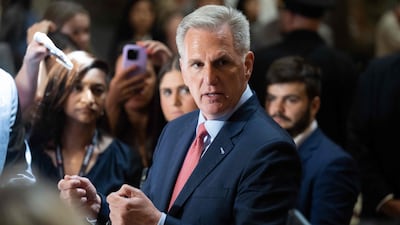Wall Street dropped on Wednesday as fears of a US default escalated, with House Speaker Kevin McCarthy saying debt ceiling talks between him and the White House remain stalled on spending cuts.
“We have to spend less than we spent last year. It is not my fault that the Democrats cannot give up on their spending,” Mr McCarthy told reporters, with eight days remaining until the possible default deadline.
The Dow had dropped 255 points, or 0.77 per cent, at the close of markets on Wednesday, while the S&P 500 and Nasdaq Composite slid 0.73 per cent and 0.61 per cent.
The White House refused to comment on the effects of debt talks on the US markets.
The 10-year Treasury yield increased slightly at 3.736 per cent.
Mr McCarthy said his negotiators would return to the White House on Wednesday to continue discussions.
“I think we can make progress today. I'm hoping that we can make progress,” he said.
'Don't blame us Republicans'
Mr McCarthy railed against President Joe Biden and Democratic members of Congress over what he claimed was an unwillingness to discuss the debt ceiling earlier this year, as well as “extreme” Democrats for their positions on spending.
Some of the key sticking points the White House and Republican leadership face are cutting back federal spending, permitting reform and new work requirements for social programmes.
The Republican Speaker of the House of Representatives has remained adamant about cutting back federal funding to 2022 levels, but that has received significant pushback from Democrats.
“We're going to solve this problem. I will stay with it until we can get it done,” he said. “But let's be honest about this. We have to spend less than we spent last year.”
Mr McCarthy did not elaborate on concessions he was willing to make in negotiations with the Biden administration.
Adding to anxiety in Washington is that any deal struck between the two sides must be approved by Democratic and Republican politicians.
Mr McCarthy, who faced several rounds of voting to become House Speaker, must placate hard-right members of his party in securing a deal.
Democrats, meanwhile, fear Mr Biden could be giving too many concessions.
The top Republican in the House said the prolonged debt ceiling negotiations are similar to his battle to become House Speaker.
“I didn't win Speaker on the first vote. It took 15 rounds. And you know what? I what I think we're stronger for it,” he said.
“I firmly believe that we'll be able to get there.”
Yellen reaffirms default warning
Defaulting on its financial obligations would have disastrous effects for the US and global economy, Treasury Secretary Janet Yellen warned.
The US government would have to delay payments for social programmes, the stock market would sink and the strength of the dollar would be in jeopardy.
“There will be some obligations we will be unable to pay,” Ms Yellen said.
And minutes released from the Federal Reserve's May 2-3 meeting showed some policymakers at the central bank were concerned that the debt limit would not be raised quickly enough.
Failure to do so would threaten "significant disruptions to the financial system and tighter financial conditions that weaken the economy", notes from the meeting read.
Even a short-term default would lead to millions of jobs lost and a major slowdown in economic activity, analysis by Goldman Sachs and Moody's shows.
Fed chairman Jerome Powell has previously warned that the central bank would not be able to protect the US economy from the short and long-term risks of a debt default.
“If you just pulled federal spending out of the economy, a large chunk of that spending in the short term – people's incomes go down, they can't spend the money and there are reverberations from that,” said Dr Wayne Winegarden, senior fellow in business and economics at the Pacific Research Institute.
“There are economic consequences and if it persists for long enough you're creating hardships and possibly economic downturn.”

Dr Winegarden does not anticipate a default, arguing that a last-minute compromise is the likeliest outcome.
“I just don't see [a default] happening and I think a lot of this is political theatrics that's going to work itself out,” he said.
And even with days remaining until the deadline, Mr McCarthy insisted a deal would be reached.
“We're going to raise the debt ceiling,” he said.
Senate minority leader Mitch McConnell, who attended two meetings with Mr Biden and other congressional leaders on debt talks, said the continuing negotiations were part of a normal process.
“Look, I think everybody needs to relax,” Mr McConnell said.


